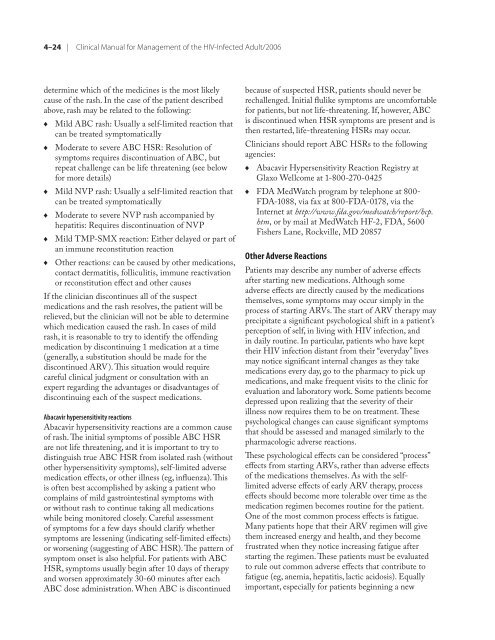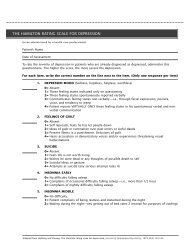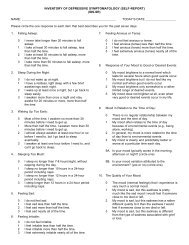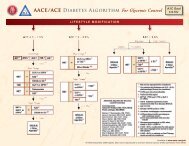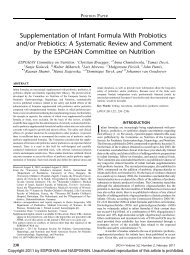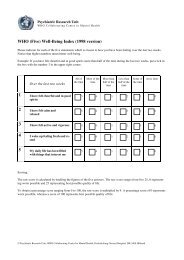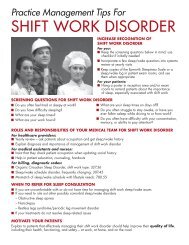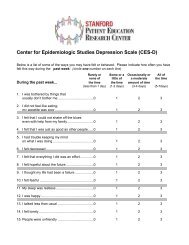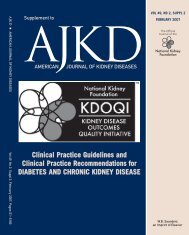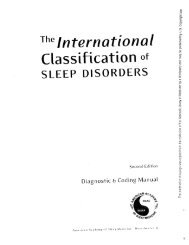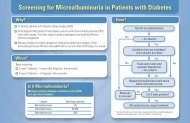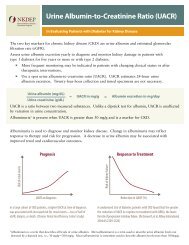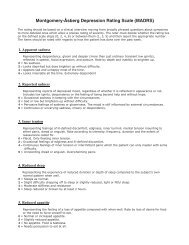Clinical Manual for Management of the HIV-Infected ... - myCME.com
Clinical Manual for Management of the HIV-Infected ... - myCME.com
Clinical Manual for Management of the HIV-Infected ... - myCME.com
You also want an ePaper? Increase the reach of your titles
YUMPU automatically turns print PDFs into web optimized ePapers that Google loves.
4–24 | <strong>Clinical</strong> <strong>Manual</strong> <strong>for</strong> <strong>Management</strong> <strong>of</strong> <strong>the</strong> <strong>HIV</strong>-<strong>Infected</strong> Adult/2006<br />
determine which <strong>of</strong> <strong>the</strong> medicines is <strong>the</strong> most likely<br />
cause <strong>of</strong> <strong>the</strong> rash. In <strong>the</strong> case <strong>of</strong> <strong>the</strong> patient described<br />
above, rash may be related to <strong>the</strong> following:<br />
♦<br />
♦<br />
♦<br />
♦<br />
♦<br />
♦<br />
Mild ABC rash: Usually a self-limited reaction that<br />
can be treated symptomatically<br />
Moderate to severe ABC HSR: Resolution <strong>of</strong><br />
symptoms requires discontinuation <strong>of</strong> ABC, but<br />
repeat challenge can be life threatening (see below<br />
<strong>for</strong> more details)<br />
Mild NVP rash: Usually a self-limited reaction that<br />
can be treated symptomatically<br />
Moderate to severe NVP rash ac<strong>com</strong>panied by<br />
hepatitis: Requires discontinuation <strong>of</strong> NVP<br />
Mild TMP-SMX reaction: Ei<strong>the</strong>r delayed or part <strong>of</strong><br />
an immune reconstitution reaction<br />
O<strong>the</strong>r reactions: can be caused by o<strong>the</strong>r medications,<br />
contact dermatitis, folliculitis, immune reactivation<br />
or reconstitution effect and o<strong>the</strong>r causes<br />
If <strong>the</strong> clinician discontinues all <strong>of</strong> <strong>the</strong> suspect<br />
medications and <strong>the</strong> rash resolves, <strong>the</strong> patient will be<br />
relieved, but <strong>the</strong> clinician will not be able to determine<br />
which medication caused <strong>the</strong> rash. In cases <strong>of</strong> mild<br />
rash, it is reasonable to try to identify <strong>the</strong> <strong>of</strong>fending<br />
medication by discontinuing 1 medication at a time<br />
(generally, a substitution should be made <strong>for</strong> <strong>the</strong><br />
discontinued ARV). This situation would require<br />
careful clinical judgment or consultation with an<br />
expert regarding <strong>the</strong> advantages or disadvantages <strong>of</strong><br />
discontinuing each <strong>of</strong> <strong>the</strong> suspect medications.<br />
Abacavir hypersensitivity reactions<br />
Abacavir hypersensitivity reactions are a <strong>com</strong>mon cause<br />
<strong>of</strong> rash. The initial symptoms <strong>of</strong> possible ABC HSR<br />
are not life threatening, and it is important to try to<br />
distinguish true ABC HSR from isolated rash (without<br />
o<strong>the</strong>r hypersensitivity symptoms), self-limited adverse<br />
medication effects, or o<strong>the</strong>r illness (eg, influenza). This<br />
is <strong>of</strong>ten best ac<strong>com</strong>plished by asking a patient who<br />
<strong>com</strong>plains <strong>of</strong> mild gastrointestinal symptoms with<br />
or without rash to continue taking all medications<br />
while being monitored closely. Careful assessment<br />
<strong>of</strong> symptoms <strong>for</strong> a few days should clarify whe<strong>the</strong>r<br />
symptoms are lessening (indicating self-limited effects)<br />
or worsening (suggesting <strong>of</strong> ABC HSR). The pattern <strong>of</strong><br />
symptom onset is also helpful. For patients with ABC<br />
HSR, symptoms usually begin after 10 days <strong>of</strong> <strong>the</strong>rapy<br />
and worsen approximately 30-60 minutes after each<br />
ABC dose administration. When ABC is discontinued<br />
because <strong>of</strong> suspected HSR, patients should never be<br />
rechallenged. Initial flulike symptoms are un<strong>com</strong><strong>for</strong>table<br />
<strong>for</strong> patients, but not life-threatening. If, however, ABC<br />
is discontinued when HSR symptoms are present and is<br />
<strong>the</strong>n restarted, life-threatening HSRs may occur.<br />
Clinicians should report ABC HSRs to <strong>the</strong> following<br />
agencies:<br />
♦<br />
♦<br />
Abacavir Hypersensitivity Reaction Registry at<br />
Glaxo Well<strong>com</strong>e at 1-800-270-0425<br />
FDA MedWatch program by telephone at 800-<br />
FDA-1088, via fax at 800-FDA-0178, via <strong>the</strong><br />
Internet at http://www.fda.gov/medwatch/report/hcp.<br />
htm, or by mail at MedWatch HF-2, FDA, 5600<br />
Fishers Lane, Rockville, MD 20857<br />
O<strong>the</strong>r Adverse Reactions<br />
Patients may describe any number <strong>of</strong> adverse effects<br />
after starting new medications. Although some<br />
adverse effects are directly caused by <strong>the</strong> medications<br />
<strong>the</strong>mselves, some symptoms may occur simply in <strong>the</strong><br />
process <strong>of</strong> starting ARVs. The start <strong>of</strong> ARV <strong>the</strong>rapy may<br />
precipitate a significant psychological shift in a patient’s<br />
perception <strong>of</strong> self, in living with <strong>HIV</strong> infection, and<br />
in daily routine. In particular, patients who have kept<br />
<strong>the</strong>ir <strong>HIV</strong> infection distant from <strong>the</strong>ir “everyday” lives<br />
may notice significant internal changes as <strong>the</strong>y take<br />
medications every day, go to <strong>the</strong> pharmacy to pick up<br />
medications, and make frequent visits to <strong>the</strong> clinic <strong>for</strong><br />
evaluation and laboratory work. Some patients be<strong>com</strong>e<br />
depressed upon realizing that <strong>the</strong> severity <strong>of</strong> <strong>the</strong>ir<br />
illness now requires <strong>the</strong>m to be on treatment. These<br />
psychological changes can cause significant symptoms<br />
that should be assessed and managed similarly to <strong>the</strong><br />
pharmacologic adverse reactions.<br />
These psychological effects can be considered “process”<br />
effects from starting ARVs, ra<strong>the</strong>r than adverse effects<br />
<strong>of</strong> <strong>the</strong> medications <strong>the</strong>mselves. As with <strong>the</strong> selflimited<br />
adverse effects <strong>of</strong> early ARV <strong>the</strong>rapy, process<br />
effects should be<strong>com</strong>e more tolerable over time as <strong>the</strong><br />
medication regimen be<strong>com</strong>es routine <strong>for</strong> <strong>the</strong> patient.<br />
One <strong>of</strong> <strong>the</strong> most <strong>com</strong>mon process effects is fatigue.<br />
Many patients hope that <strong>the</strong>ir ARV regimen will give<br />
<strong>the</strong>m increased energy and health, and <strong>the</strong>y be<strong>com</strong>e<br />
frustrated when <strong>the</strong>y notice increasing fatigue after<br />
starting <strong>the</strong> regimen. These patients must be evaluated<br />
to rule out <strong>com</strong>mon adverse effects that contribute to<br />
fatigue (eg, anemia, hepatitis, lactic acidosis). Equally<br />
important, especially <strong>for</strong> patients beginning a new


